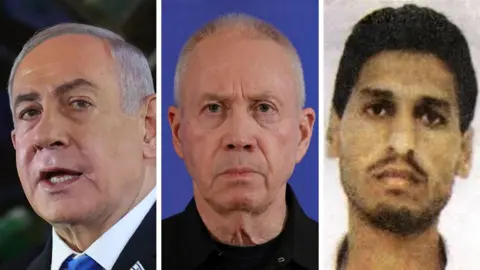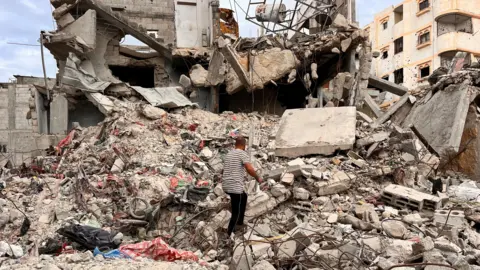ICC issues arrest warrants for Netanyahu, Gallant and Hamas commander

 EPA / Reuters / Supplied
EPA / Reuters / SuppliedJudges at the International Criminal Court (ICC) have issued arrest warrants for Israel’s prime minister and former defence minister, as well as the military commander of Hamas.
A statement said a pre-trial chamber had rejected Israel’s challenges to the court’s jurisdiction and issued warrants for Benjamin Netanyahu and Yoav Gallant.
A warrant was also issued for Mohammed Deif of Hamas, although Israel has said he was killed in an air strike in Gaza in July.
The judges said there were “reasonable grounds” the three men bore “criminal responsibility” for alleged war crimes and crimes against humanity during the war between Israel and Hamas. Both Israel and Hamas have rejected the allegations.
Prime Minister Netanyahu condemned the ICC’s decision as “antisemitic”, while Hamas said the warrants for Netanyahu and Gallant had set an “important historical precedent”.
The impact of these warrants will in part depend on whether the ICC’s 124 member states – which do not include Israel or its main ally, the United States – decide to enforce them or not.
The White House said the US rejected the ICC decision.
However, several European countries have said they respect the decisions of the court.
The ICC has the authority to prosecute those accused of genocide, crimes against humanity and war crimes on the territory of states party to the Rome Statute, its founding treaty.
Israel rejects the ICC’s jurisdiction, but the court ruled in 2021 that it had jurisdiction over the occupied West Bank, East Jerusalem and Gaza because the UN’s secretary general had accepted the Palestinians were a member.
What are the charges?
In May, the ICC prosecutor Karim Khan sought warrants for Netanyahu, Gallant, Deif and two other Hamas leaders who have since been killed, Ismail Haniyeh and Yahya Sinwar.
Although Israel believes Deif is dead, the chamber said it had been notified by the ICC prosecution that it was not in a position to determine whether he was killed or remained alive.
The prosecutor’s case against them stems from the events of 7 October 2023, when Hamas gunmen attacked southern Israel, killing about 1,200 people and taking 251 others back to Gaza as hostages.
Israel responded to the attack by launching a military campaign to eliminate Hamas, during which at least 44,000 people have been killed in Gaza, according to the territory’s Hamas-run health ministry.
For Deif, the chamber found reasonable grounds to believe he was “responsible for the crimes against humanity of murder; extermination; torture; and rape and other form of sexual violence; as well as the war crimes of murder, cruel treatment, torture; taking hostages; outrages upon personal dignity; and rape and other form of sexual violence”.
It also said there were reasonable grounds to believe the crimes against humanity were “part of a widespread and systematic attack directed by Hamas and other armed groups against the civilian population of Israel”.
 Reuters
ReutersFor Netanyahu and Gallant, who was replaced as defence minister earlier this month, the chamber found reasonable grounds to believe that they “each bear criminal responsibility for the following crimes as co-perpetrators for committing the acts jointly with others: the war crime of starvation as a method of warfare; and the crimes against humanity of murder, persecution, and other inhumane acts”.
It also found reasonable grounds to believe that “each bear criminal responsibility as civilian superiors for the war crime of intentionally directing an attack against the civilian population”.
The chamber also noted that it had rejected two Israeli challenges – one disputing the ICC’s jurisdiction over the Palestinian territories, and Israeli nationals specifically, and the other arguing that the ICC prosecutor had not given Israel the opportunity to investigate the allegations itself before requesting warrants.
The ICC is a court of last resort and is only supposed to act when domestic courts cannot, or will not, genuinely investigate or prosecute serious international crimes.
Will Netanyahu and Gallant be arrested?
Despite the warrants, Netanyahu and Gallant do not face any immediate threat of prosecution, although it could make it difficult for them to travel abroad.
Technically, if either of them set foot in any ICC member state they must be arrested and handed over to the court.
Netanyahu’s most recent overseas trip was in July to the US, which is not a member. But last year, he visited several other countries, including the UK, which is.
When asked by journalists if Netanyahu would be arrested if he came to the UK, the government spokesman replied: “We are not getting into hypotheticals.”
It is believed a domestic legal process would be required in the UK to determine whether to endorse the warrant.
Two EU countries – Italy and the Netherlands – have said openly they would arrest any of the men on their territory. Several other European countries promised to comply with the ICC’s rules without specifying this.
ICC members do not always choose to enforce warrants.
Russian President Vladimir Putin, wanted over alleged war crimes in Ukraine, received a warm welcome and was not arrested during an official visit to neighbouring Mongolia – an ICC member – in September.
South Africa, another ICC member, also failed to arrest then-Sudanese President Omar al-Bashir when he visited in 2015 despite him facing a warrant for alleged war crimes in the Darfur region.
How have Israel and Hamas reacted?
Netanyahu said in a video that it was a “dark day in the history of humanity”, and that the ICC has become “the enemy of humanity.
“It’s an antisemitic step that has one goal – to deter me, to deter us from having our natural right to defend ourselves against enemies who try to destroy us,” he said.
Gallant said the court’s decision “places the State of Israel and the murderous leaders of Hamas in the same row and thus legitimises the murder of babies, the rape of women and the abduction of the elderly from their beds”.
Hamas made no mention of the warrant for Deif but welcomed the warrants for Netanyahu and Gallant, saying the ICC’s decision “constitutes an important historical precedent, and a correction to a long path of historical injustice against our people”.
Israel has vehemently denied the allegation its forces are committing genocide against Palestinians in Gaza, which is the subject of a separate case before the International Court of Justice.
The Palestinian Authority – which runs parts of the West Bank – said the decision “represents hope and confidence in international law and its institutions” and urged ICC member states to halt “contact and meetings” with Netanyahu and Gallant.
Palestinians in Gaza expressed hope that it would bring Israeli leaders to justice.
“The court’s decision may ease some of my pain, but my sister’s soul – and those of tens of thousands of Palestinian victims – will not find peace until Netanyahu and his army leaders are behind bars,” Munira al-Shami, whose sister Wafa was killed in an Israeli attack a month ago, told the BBC.
 Reuters
ReutersHuman Rights Watch said the warrants for the three men “break through the perception that certain individuals are beyond the reach of the law”.
A White House National Security Council spokesperson said the US “fundamentally rejects” the court’s decision.
“We remain deeply concerned by the prosecutor’s rush to seek arrest warrants and the troubling process errors that led to this decision,” a White House national security council spokesperson said.
However, EU foreign policy chief Josep Borrell said it was “not a political decision” and should be respected, noting that it was binding on all EU member states.
A UK government spokesman said: “We respect the independence of the International Criminal Court.”
Source link





